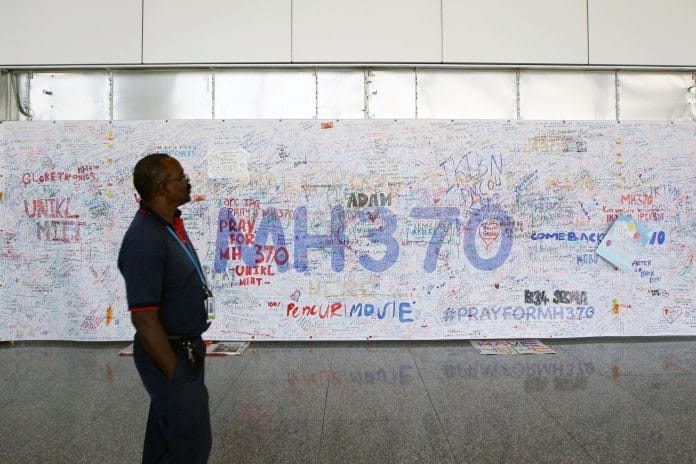British foreign secretary refers to his Chinese wife as Japanese, and Donald Trump ready for Iran talks but Tehran is not interested.
No real answers on Malaysia Airlines Flight 370
The Malaysian government’s official inquiry into the disappearance of Malaysia Airlines Flight 370 has yielded no definitive answers as to what happened to the aircraft, which disappeared four years ago.
The plane was heading from Kuala Lumpur to Beijing in March 2014 when it deviated from its path. Radar contact was lost, and it is believed that the plane crashed somewhere in the Indian Ocean after running out of fuel. No significant pieces of the wreckage have been found, and neither have any remains of the 239 people on board.
According to the report, a system failure was unlikely to have led the aircraft to veer off course, with the investigators suggesting the system was probably manipulated.
British foreign secretary refers to his Chinese wife as Japanese, in China
Jeremy Hunt, Britain’s new foreign secretary, made an awkward debut in China by mistakenly referring to his Chinese wife as Japanese, reports The Guardian.
“My wife is Japanese — my wife is Chinese. That’s a terrible mistake to make,” he told his Chinese counterpart, foreign minister Wang Yi.
China and Japan are longtime rivals, even though the relationship has been a touch better of late, the report added.
Hunt is in China to try and strengthen trade ties with Beijing ahead of Britain’s exit from the European Union next year. He will also be discussing climate change and UN sanctions against North Korea.
Formerly the health minister, Hunt succeeded Boris Johnson as foreign minister, after Johnson’s dramatic resignation over Prime Minister Theresa May’s Brexit proposals earlier this month. Small consolation for Hunt — Johnson is notorious for his diplomatic gaffes, in office and before.
Trump says he will meet Hassan Rouhani, but Iran rules it out
“President Trump, who walked away from a nuclear deal with Iran despite that country’s documented compliance, said Monday that he would meet with President Hassan Rouhani with ‘no preconditions’ as soon as the Iranian leader agreed to do so,” The New York Times reports.
But just hours before Trump addressed the media, Iran said talks with the United States would be impossible under the Trump administration’s “hostile policies”.
“With current America and these policies, there will definitely not be the possibility of dialogue and engagement, and the United States has shown that it is totally unreliable,” a spokesman for Iran’s foreign ministry said, “I think there are no conditions for such a discussion…”
First time in 38 years, Robert Mugabe not a choice for Zimbabwe voters
Zimbabweans who went to vote Monday did not have Robert Mugabe as an option for the first time in 38 years — but even though his name is not on the ballot, his “ruinous legacy endures”, The Economist writes.
The election is between President Emmerson Mnangagwa, Mugabe’s long-time supporter and successor as leader of the Zanu-PF party, and Nelson Chamisa, the leader of the MDC alliance, Reuters reports.
Not to be left out of the spotlight, Mugabe announced on the eve of the election that he would vote for the opposition.
The election winner faces the task of putting Zimbabwe back on track after nearly four decades of Mugabe rule “tainted by corruption, mismanagement and diplomatic isolation that caused a crisis in a country that once had one of Africa’s most promising economies”, Reuters writes.
GPS will helps Chinese Muslims find their way in Mecca and Medina
“More than 11,000 Chinese Muslims are heading in official groups to Mecca and Medina for the month-long Hajj this year, and Chinese organisers of the pilgrimage say a special GPS card pilot programme will make the trip better and safer,” reports Global Times.
The electronic device will include the name, photo and passport number of the pilgrim. It will also contain a QR code and a rescue phone number. As many as 3,300 pilgrims will be wearing the card this year.
“The device also has an SOS button. If the pilgrim gets lost or encounters an emergency situation, organisers… will receive an alarm from an app installed on their mobile phone,” the report adds.
The ‘zombie apocalypse’ threatening free and fair polls
In Foreign Policy, Lee Morgenbesser, an assistant professor at Griffith University’s School of Government and International Relations in Australia, writes that fake electoral “endorsements” are becoming normal for dictators and autocrats across the world.
“Cambodians went to the polls last weekend, but it was a sham of an election, dominated by Hun Sen, the country’s aging autocrat. With the opposition party banned and soldiers at polling booths to ensure the outcome went only one way, no credible organisation signed off on the election’s validity — but quite a few fake organisations did,” he writes.
To lend credibility to Hun Sen’s election, a man named Anton Caregea used “zombie monitors”, like Institute of International Relations and Economic Cooperation and European Council on International Relations to release reports that the election was “transparent, free, fair and democratic valid polls”.
But these kinds of monitors are being used worldwide, in countries like Russia, Azerbaijan, Malaysia, Egypt, Venezuela — the “appeal of fake election observation groups” is global, the report adds.






